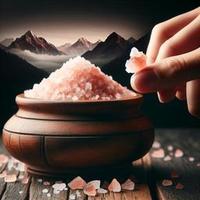
1 serving (1 grams) contains 0 calories, 0.0 grams of protein, 0.0 grams of fat, and 0.0 grams of carbohydrates.

Log this food in SnapCalorie

Nutrition Information
Calories |
0 | ||
|---|---|---|---|
% Daily Value* |
|||
| Total Fat | 0 g | 0% | |
| Saturated Fat | 0 g | 0% | |
| Polyunsaturated Fat | 0 g | ||
| Cholesterol | 0 mg | 0% | |
| Sodium | 52270.9 mg | 2272% | |
| Total Carbohydrates | 0 g | 0% | |
| Dietary Fiber | 0 g | 0% | |
| Sugars | 0 g | ||
| protein | 0 g | 0% | |
| Vitamin D | 0 mcg | 0% | |
| Calcium | 0 mg | 0% | |
| Iron | 0 mg | 0% | |
| Potassium | 0 mg | 0% | |
* Percent Daily Values are based on a 2,000 calorie diet. Your daily values may be higher or lower depending on your calorie needs.
Food Attributes
Source of Calories
About Pink himalayan salt
Pink Himalayan salt, harvested from ancient sea salt deposits in the Himalayan region of Pakistan, is prized for its unique mineral composition and subtle flavor. Unlike regular table salt, this variety contains trace amounts of minerals such as potassium, magnesium, and calcium, which give it its distinct pink hue. Its coarse texture makes it ideal for finishing dishes or creating salt rubs, while finer granules are often used in cooking or baking. Commonly associated with healthy eating, Pink Himalayan salt is free from additives and has gained popularity in holistic nutrition circles. However, like all salts, it should be consumed in moderation to avoid excessive sodium intake, which can lead to health concerns. Whether grounding it into spice blends or using it to enhance savory dishes, this versatile salt brings a natural, mineral-rich alternative to standard iodized salts.



